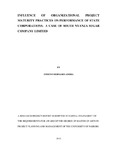| dc.description.abstract | Project performance in the public sector in Kenya poses a significant challenge despite increasing allocation of funds for development programs and projects. The local sugar sector continues to attract interest in light of its inability to realize its full potential and attain regional competitiveness. The study aimed at investigating the existence and influence of organizational project maturity practices on the performance of South Nyanza Sugar Company Limited in light of its historic weak business results strategy deployment. The objective of the study was to assess the role, extent and influence of project factors and practices in the knowledge areas of communication, risk, human resource, quality and procurement management practices on project results and organizational performance. The study conceptually defined organizational project maturity practices along various dimensions. The independent variables included the project communication, risk, quality, procurement and human resource management whilst the dependent variables were project scope, cost and time performance. The study is significant in that it examines new approaches for improving the management of projects in the public sector, offers an alternative but effective framework for management of opportunities for diversification of product base within the Kenyan sugar industry and provides options for improved Sugar sector project performance and enhanced global competiveness. The study will spur further research interest in other aspects of an sponsor organization that impact project performance and help resolve the vexing question of poor utilization of development funds by governments and government agencies through effective project and program implementation. The study was a descriptive research that targeted all the employees of South Nyanza Sugar Company Limited in the job grades between Supervisors and Executive management who regularly interact with project work. A sample size of 196 was adopted using the Krejcie & Morgan table. A sampling frame was used to randomly select the sample of respondents who were segregated through a stratification framework to assure representation of the different job cadres within the population in the study sample. A self-administered questionnaire was sent to the respondents and structured interviews and document examination was also conducted. Content reliability of the research questionnaire was tested using a test - retest method alongside an acceptance criterion.
10% of the population was used in piloting the questionnaire. Expert advice from the researcher’s supervisor and South Nyanza Sugar Company Limited functional managers acting as subject matter experts was used to validate the research tools. Information from empirical studies and reference texts in the nine knowledge areas in project management maturity and piloting of the questionnaire was used to improve the content of the data collection tools. A response rate of 61.73 % was achieved. Data collected was analyzed using descriptive statistics. The study findings indicate all respondents had above ‘O’ level education, majority had served the company for 5 years and above, were male and were above the 35 year age bracket. The major research findings were that significant relationship existed between project performance in the areas of scope, time and cost and the prevalence of use of the organizational project management maturity practices of communication, risk, quality, procurement, human resource management. The findings indicated that the most prevalent practice was in procurement management compared to communication, risk, quality, human resource management all of which had low index for prevalence. The researcher recommends improvement in the maturity practices of project communication, risk, quality, procurement and human resource through benchmarking and development of effective metrics for tracking performance in each element of maturity to consistently improve project performance. | en |

